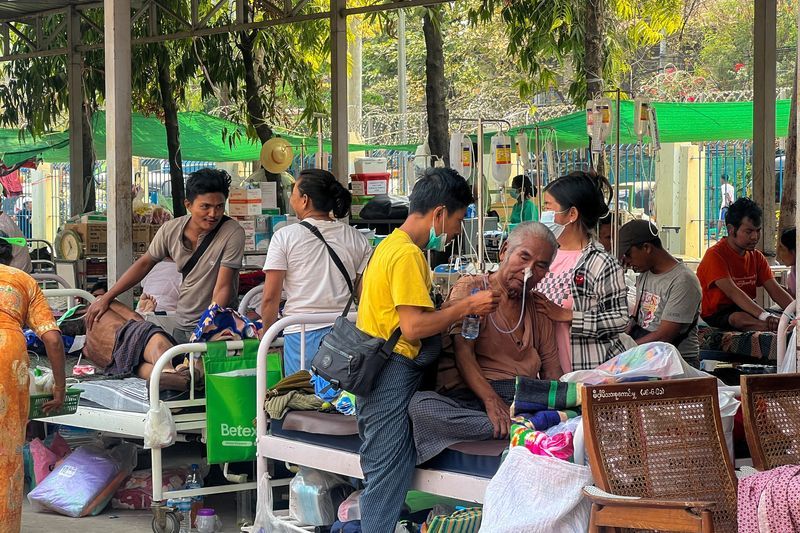DUBAI (Reuters) - Mohamed Badie, the top leader of Egypt's outlawed Muslim Brotherhood organisation, was once seen as the Khamenei of Egypt and one of the masterminds responsible for the ascend of the organisation to power following the toppling of former President Hosni Mubarak.
Badie was elected in 2010 as the eighth "general guide" of the organisation, which once was the largest and most influential Islamist movement in the Middle East, just one year before the Arab Spring uprisings.
He began to draw comparisons to Iran's supreme leader Ayatollah Ali Khamenei after he led the brotherhood to a parliament majority through its political wing first established during his reign, the Freedom and Justice Party (FJP), and the rise of former Egyptian President Mohamed Mursi as the first democratically elected head of state in Egypt's modern history.
Badie, 81, was born in Cairo's industrial city of
El-Mahalla El-Kubra, a politically active workers city that later witnessed protests against Mursi.
He graduated from Cairo University's veterinary school where he first joined the Brotherhood and also got his PhD. He later worked as a professor atBeni-Suef University.
He was imprisoned several times during his life, the first of which was after a 15-year sentence in a military case in 1965 that saw the execution of Brotherhood luminary Sayyid Qutb, whose Islamist revolutionary writings have supplied ideological fuel for militancy in Egypt and beyond for decades.
Qutb, who has been cited as a major influence on Badie, was sentenced on charges of trying to overthrow the state of former socialist President Gamal Abdel Nasser. Badie only served nine years out of the fifteen.
Badie was imprisoned in two other military cases during Mubarak's reign, before being sentenced to life in at least three cases after being convicted for his role in the violence that broke out after the army, led by then General Abdel Fattah al-Sisi, toppled Mursi following mass demonstrations against him.
He faced a death sentence in another case in what rights groups call an unprecedented crackdown by the government of now President Sisi, who promised during campaigning for the presidency to wipe out the Brotherhood. Badie’s only son, Ammar, was killed during the military’s clearing of protests in 2013.
"There is not a single valid legal piece of evidence for any accusation brought against me," Badie told a court overseeing the case of "the Rabaa sit-in dispersal" against him in 2016.
The Brotherhood and their supporters camped for weeks in the streets around Rabaa al-Adawiya Square in Cairo where rights groups say more than 800 people were killed as security forces stormed in to clear it out.
Under Badie, an Islamist hardliner, the Brotherhood envisioned Egypt as a bulwark in an attempt to Islamise the Middle East. It wanted to make Egypt, the region's biggest state with its largest military, a model Islamic society. The problem was that Egyptian Muslims felt patronized by the Brotherhood’s attempts to tell them about how best to be a Muslim, which led to mass protests against it.
Badie drew wide criticism when he was seen as the de-facto ruler of Egypt, many denounced his overarching influence that overshadowed Mursi. A Sunni governing system that alarmingly resembled Shi'ite Iran, where an Islamist leader becomes the governing reference to a democratically elected president, was broadly disapproved of in Egypt.
Publicly, the Brotherhood refuted such criticisms and Badie denied such influence.
"President Mursi is the real president of Egypt, and I do not accept interfering in his work whatsoever or even serving as a conduit to the President for anybody," Badie said in an interview with Asharq Al-Awsat in 2012.
"The President (Mursi) is now the President of all Egyptians, and he has resigned from all his leadership positions within the Muslim Brotherhood and (Freedom and Justice) party. So we should not try and create obstacles to the march, because we cannot build anything by stimulating such issues," Badie added.
The army said it was forced to intervene in 2013 by a popular uprising against the Brotherhood’s partisan rule. Badie and Mursi, who died in 2019 after collapsing in a Cairo court while on trial on espionage charges, were thrown in jail with many of the prominent Brotherhood figures and hundreds of their supporters.
"If they executed me one thousand times I will not retreat from the right path," Badie was quoted as saying in 2014 by lawyer Osama Mursi, Mohamed Mursi's son, who attended one of his trials in Cairo.
(Reporting by Nayera Abdallah)






































